#Dame May Whitty
Explore tagged Tumblr posts
Text

Publicity portrait of Dame May Whitty for Mervyn LeRoy’s MADAME CURIE (1943).
27 notes
·
View notes
Text

#The Constant Nymph#Joan Fontaine#Charles Boyer#Alexis Smith#Charles Coburn#Peter Lorre#Brenda Marshall#Dame May Whitty#Edmund Goulding#1943
13 notes
·
View notes
Text

Sospecha (1941)




2 notes
·
View notes
Text
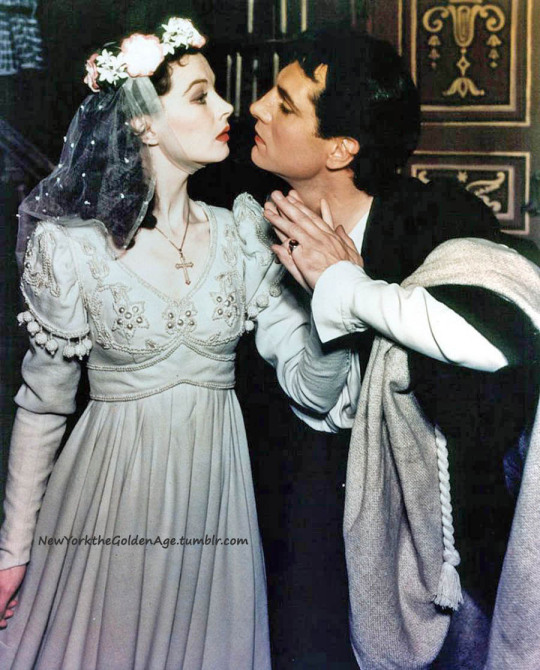
Vivien Leigh and Laurence Olivier in Romeo and Juliet, which ran for a month at the 51st St. Theater (later the Mark Hellinger; now a church) in 1940. Dame May Whitty played Juliet's nurse, Edmond O'Brien was Mercutio, and Cornell Wilde was Tybalt. Olivier produced, directed, and (lavishly) designed the production in addition to starring in it. The critics were not kind: "Much scenery: no play," said Brooks Atkinson in the Times. Time magazine said that Leigh “looked like a poem but had no sense of poetry.” Leigh and Olivier were several years into a passionate romance that would, a few months after the play, result in marriage.
Photo: Getty Images
#vintage New York#1940s#Vivien Leigh#Laurence Olivier#Romeo & Juliet#Shakespeare#vintage Broadway#theater#vintage theater
255 notes
·
View notes
Text
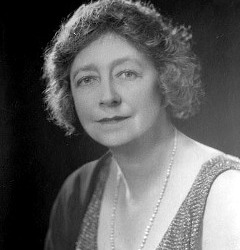

Propaganda
May Whitty (The Lady Vanishes, Gaslight, Bill of Divorcement, Suspicion, Mrs Miniver)—Wonderful character actress who light up every film she's in. First actress to be invested as a Dame in 1918 started her career on stage with Sir Henry Irving, [editor's note: the propaganda abruptly cuts off post-comma. The propaganda vanishes]
Martita Hunt (Great Expectations, Anastasia)—The original Miss Havisham - hot mad old lady for the win!
This is round 1 of the tournament. All other polls in this bracket can be found here. Please reblog with further support of your beloved hot sexy vintage woman.
[additional propaganda submitted under the cut.]
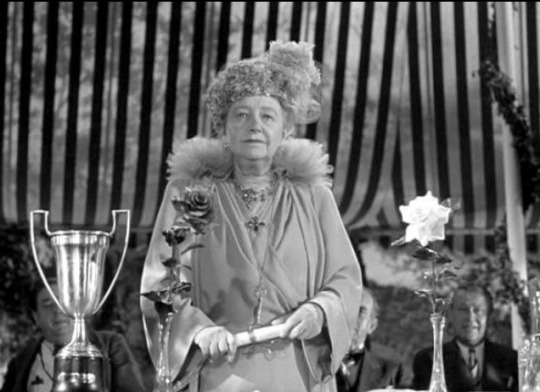
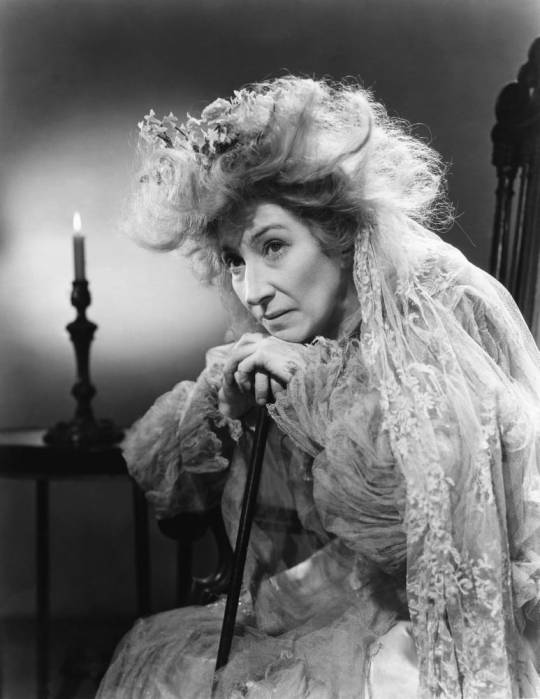
107 notes
·
View notes
Text
crowd vs. critic single take // MRS. MINIVER (1942)

Photo credits: IMDb.com
Mrs. Miniver takes place in two eras: the time before September 3, 1939 and the time after.
Before Great Britain declares war on Germany, Mr. Clem (Walter Pidgeon) and Mrs. Kay (Greer Garson) Miniver’s biggest concerns are about money. Specifically, they spend their energy convincing each other—and their upper crust neighbor Lady Beldon (Dame Mae Whitty)—their spending on little luxuries like hats and cars is worthy of their family’s middle class income. Though Lady Beldon does not care for blurring social lines, her granddaughter Carol (Teresa Wright) is more open-minded, catching the eye of the collegiate Vin Miniver (Richard Ney). But everything changes on September 3rd. Vin enlists, Clem volunteers, and Kay makes a bomb shelter comfortable for their young children. For the Minivers, World War II is not just on the battlefield on the continent—it’s here at home.

CROWD // And the Academy’s love affair with World War II begins! Mrs. Miniver is the first of 11 Best Picture winners set during or immediately after the war, which means more than 10% of the Academy’s top prizes have been dedicated to defeating the Nazis. Even among those titles, though, Mrs. Miniver is singular. Casablanca, From Here to Eternity, The Bridge on River Kwai, Patton, and The English Patient follow soldiers and resistance fighters; The Sound of Music, Schindler’s List, and The King’s Speech recount true stories of extraordinary individuals living through the conflict; and The Best Years of Our Lives and An American in Paris depict the struggle to rebuild the world afterward.
Unlike those epics, we only see the Minivers on the homefront. Vin joins the Royal Air Force, but like his mother, we only wonder what he sees from the cockpit. Clem supports the efforts at Dunkirk, but Christopher Nolan still felt the need to depict that rescue of troops in his own film because we never see Clem beyond the horizon of Britain’s shores. Yes, the episodic Miniver lacks the jet-fueled forward propulsion of Nolan’s film, but that wouldn’t be honest with the civilian experience. The family’s skirmishes with danger are few and unpredictable, and in some ways, that makes them more upsetting. When tragedy does strike, it hits a family we’ve laughed and rejoiced with around the dinner table, making this melodrama still moving today.
POPCORN POTENTIAL: 8/10

CRITIC // If there’s any criticism to be leveled at Mrs. Miniver, it’s that its affection for the titular family is blind. Character flaws? Complex motives? Who needs them when you’re trying to create a rousing morale-booster justifying a global conflict still in the court of public opinion? The Minivers and their neighbors are symbolic avatars more than well-rounded individuals, which is just one reason Winston Churchill called this film “propaganda worth a hundred battleships.” In fact, the last scene was literally re-distributed as print and radio propaganda!
Still, given that this particular fight against fascism is one with fewer moral gray areas, romanticizing these people fighting out of uniform has aged better than, say, a film about the Russian Revolution. In the history of cinema, a majority of war films focus on combat and political leaders, while Mrs. Miniver reminds us the people at home—including but not limited to the oft-disenfranchised women, children, elderly, and working classes—can be just as cudgeled by war without enlisting. They may avoid the trenches, but their food, shelter, life, and limb are just as uncertain, not to mention the future of their loved ones serving in the military. With that in mind, who’s to complain about making these hometown heroes so likable?
It’s also difficult to fault Mrs. Miniver for idolizing its subjects when its cast and its craft are working in tandem with its vision. William Wyler, who still holds the record for the most Best Director nominations at 12, assembled a cast as winning as the parts they were playing, none more than the Garson’s Mrs. Miniver herself. Her hopeful but clear-eyed face of determination creates a center of gravity for the rest of the actors, and the compassion driving her never becomes too syrupy.
ARTISTIC TASTE: 9/10
#Mrs. Miniver#1942#Best Picture#Best Picture Project#Academy Awards#Oscars#Greer Garson#Crowd#Critic#Single Take#Dame Mae Whitty#Teresa Wright#Richard Ney#Walter Pidgeon#Mrs. Miniver review#Casablanca#From Here to Eternity#The Bridge on River Kwai#Patton#The English Patient#The Sound of Music#Schindler’s List#The King’s Speech#The Best Years of Our Lives#An American in Paris#Dunkirk#Christopher Nolan#8/10#9/10
7 notes
·
View notes
Text
If I Had a Million



MGM showcased its stars in GRAND HOTEL (1932) and DINNER AT EIGHT (1933), while Paramount did much the same with ALICE IN WONDERLAND (1933) and IF I HAD A MILLION (1932, Criterion until last night). Though the latter isn’t as lustrous as MGM’s projects, it sure is a lot of fun. Disgusted with friends and family, millionaire Richard Bennett decides not just to leave his fortune to eight complete strangers, but to deliver the money personally. There follow eight segments of varying quality in which he delivers checks to China store clerk Charlie Ruggles (a delight as usual), prostitute Wynne Gibson, forger George Raft, retired vaudevillian Alison Skipworth (fortuitously married to W.C. Fields), death row inmate Gene Raymond (godawful), bookkeeper Charles Laughton, marine Gary Cooper (talking rapidly for a change) and the magnificent Dame May Whitty. The prologue and epilogue are gracefully directed by Norman Taurog, whose camera moves are to be treasured. Comedy veteran Norman Z. MacLeod directed Ruggles as a clerk tired of having his salary docked for breakage and saddled with nagging wife Mary Boland (the two were a popular team for a while). He also directed Fields and Skipworth, who are hilarious together as they use her riches to get revenge on road hogs (it would take more than a million to do that in Atlanta). Whitty’s segment, directed by the little-known Stephen Roberts, paints a grim picture of life in a home for elderly women and features an exaltation of beautiful character actresses. But the highlight is Laughton’s segment, directed by Ernst Lubitsch. It’s a masterpiece of restraint by both actor and director, setting up one of the film’s most satisfying punchlines (and the rare joke that’s as funny when you don’t know what’s coming as it is when you do). Segments featuring Cary Grant, Carole Lombard, Fredric March, Miriam Hopkins and Sylvia Sidney were either left unfilmed or abandoned unfinished. For the Fields episode, Joseph L. Mankiewicz created what would become the comic’s catchphrase, “My little chickadee,” which Fields bought from him for $50.
#omnibus films#all-star films#pre-code films#charles laughton#w.c. fields#gary cooper#may whitty#charlie ruggles#george raft#ernst lubitsch#joseph l. mankiewicz
2 notes
·
View notes
Text
MOVIE QUOTE OF THE DAY:
“Don't be stupid, Ralph. If she's taken poison, we must act as though we cared!”
Dame May Whitty in My Name Is Julia Ross
#MyNameIsJuliaRoss #JosephHLewis #DameMayWhitty
#Moviequotes #MovieQuoteOfTheDay

1 note
·
View note
Text
Analysis of 'The Lady Vanishes'
The Lady Vanishes is a 1938 film directed by Alfred Hitchcock and written by Sidney Gilliat and Frank Launder, based on the 1936 novel The Wheel Spins by Ethel Lina White. The film stars Margaret Lockwood and Michael Redgrave, with Dame May Whitty and Paul Lukas. Though filmed in London, The Lady Vanishes caught Hollywood’s attention and Hitchcock moved there soon after its release, for David O…
View On WordPress
1 note
·
View note
Text


Remembering Dame May Whitty on her birthday #botd
29 notes
·
View notes
Text
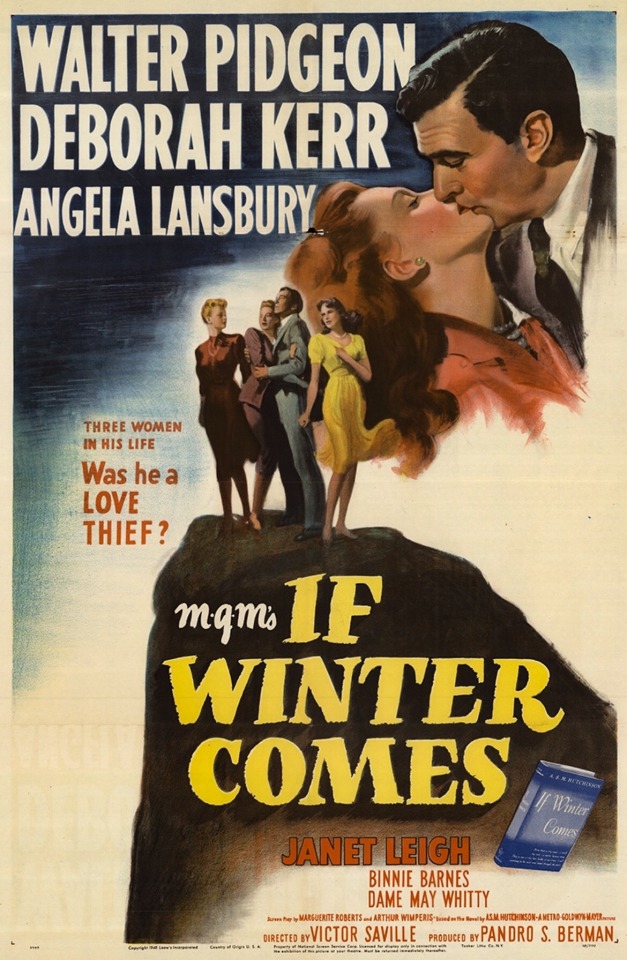
#If Winter Comes#Walter Pidgeon#Deborah Kerr#Angela Lansbury#Janet Leigh#Binnie Barnes#Dame May Whitty#Victor Saville#1947
6 notes
·
View notes
Text
'Gaslight' – Ingrid Bergman starts to lose her grip on HBO Max
‘Gaslight’ – Ingrid Bergman starts to lose her grip on HBO Max
George Cukor entered Hitchcock territory with Gaslight (1944), a shadowy tale of suspense and madness set in the gas-lit glow and cobblestone quaintness of Victorian London. Ingrid Bergman stars as a meek, uncertain heiress courted and married in a whirlwind romance by the debonair Charles Boyer, but when they move back into her childhood home she begins losing her grip on reality and becomes…

View On WordPress
#1944#Angela Lansbury#Blu-ray#Charles Boyer#Dame May Whitty#DVD#Gaslight#HBO Max#Ingrid Bergman#Joseph Cotten#VOD
4 notes
·
View notes
Text
I love that the electorate rightly thinks that the woman who gave an iconic performance as Miss Havisham deserves this. Dame May Whitty would have been a good option too
this is a poll for a movie that doesn't exist.
It is vintage times. The powers that be have decided to again remake the classic vampire novella Dracula for the screen. in an amazing show of inter-studio solidarity, Hollywood’s most elite hotties are up for the starring roles. the producers know whoever they cast will greatly impact the genre, quality, and tone of the finished film, so they are turning to their wisest voices for guidance.
you are the new casting director for this star-studded epic. choose your players wisely.
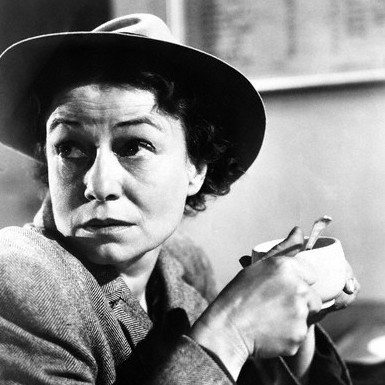
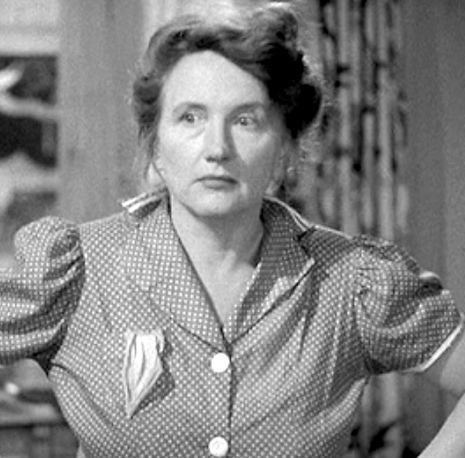
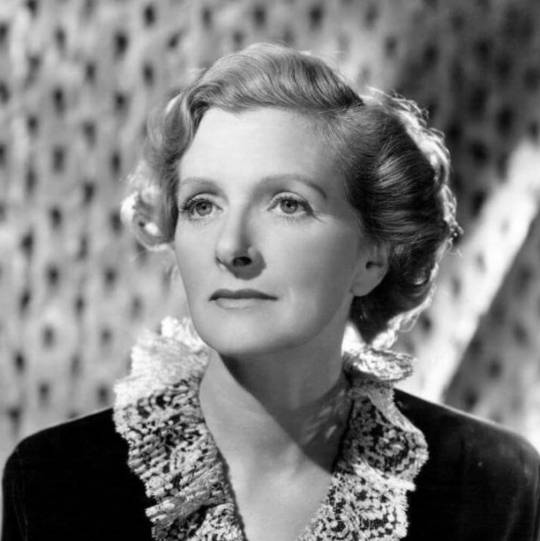

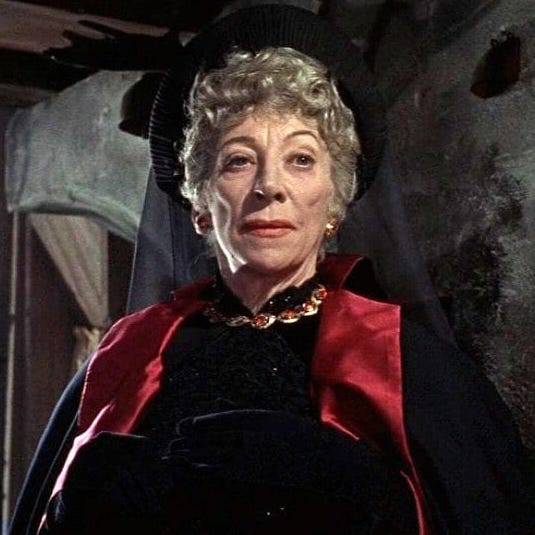
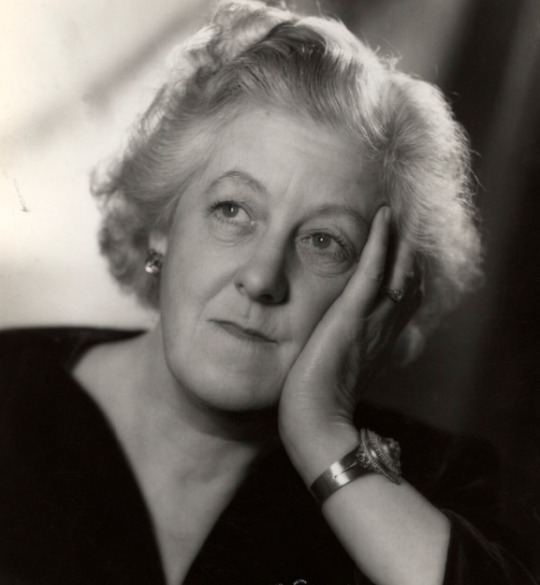
227 notes
·
View notes
Photo


The Lady Vanishes, 1938
True, this film isn’t chockful of outfits, but it is a terrific suspense story by Alfred Hitchcock and clothing does play a role in solve the mystery.
Margaret Lockwood plays a young British woman on vacation somewhere in the mountains of a small country in Europe before her trip home to be married. Just before she gets on the train, she gets a bad bump on the head and is helped by an older British woman who has just finished her job as a governess and is also going home. Or is she? The governess vanishes from the train and everyone denies having seen her. Could the young woman have imagined it all? Michael Redgrave plays a young man on the train who helps her puzzle it out while Dame May Whitty plays the governess.
You can see our heroine in her hiking togs, at a time when women only wore trousers for active sports or dirty work, and then in a satin nightdress ensemble as well as in a spiffy suit with hat when she arrives in London. She remembers the governess’ traveling outfit to a T which prompts one of the silliest lines in the film from Redgrave: “I knew it had something to do with porridge.” Watch the film and you will know why he could say that. Hitchcock did like to lighten his suspense with some humor.
#the lady vanishes#1930s clothing#vintage clothing#margaret lockwood#dame may whitty#michael redgrave#costume history#dress history#fashion history#old hollywood#suspense
20 notes
·
View notes
Photo

madame curie (1943)
#mervyn leroy#greer garson#walter pidgeon#henry travers#albert bassermann#c aubrey smith#dame may whitty#reginald owen#margaret o'brien#van johnson
6 notes
·
View notes
Text
Here are 10 things you should know about Dame May Whitty, born 156 years ago today. She enjoyed a stage and film career that lasted nearly 70 years
#Dame May Whitty#May Whitty#character actresses#British actresses#old movies#classic film#classic movies#classic Hollywood#Golden Age of Hollywood#London theatre
11 notes
·
View notes